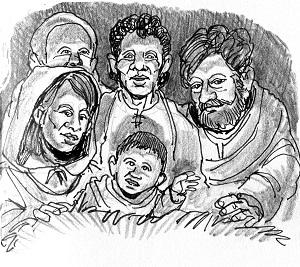
“Let us go, then, to Bethlehem to see this thing that has taken place” (Luke 2:15).
Christmas 2022
Is 62:11-12; Ps 97; Titus 3:4-7; Luke 2:15-20 (Mass at Dawn). See Lectionary for full range of readings.
In many churches, one of the most important experiences for families at Christmas is when parents take their children to visit the crèche depicting the birth of Jesus. There is an endearing familiarity to the scene of simple shepherds, sheep, oxen and a donkey huddled in around Joseph and Mary, holding the child. Parents who share this scene also know to look beyond sentimentality or tradition to see its disturbing truth.
These evocative displays were a medieval form of catechesis inspired and loved by St. Francis of Assisi because they brought Jesus to children and to the poor. Francis believed this was the point of the Gospel. God came into the world for the poor. Children’s questions about how such cold deprivation could happen to God on his birthday are crucial.
The enduring appeal of the Christmas story has always had less to do with its historical veracity than its powerful message that God loves the poor. The infancy narratives found only in Matthew and Luke are richly layered pastiches composed to show that Jesus fulfilled the promises revealed to famous figures found in the Scriptures. The authors knew this and told the story this way to urge their audiences to grasp the more demanding claims of the Incarnation -- that God is in the world on the side of the poor.
If any more explicit commentary were needed, the child’s mother, in her Magnificat, rejoiced that his birth signaled a turning point in God’s favor toward the outcast and the hungry, the weak and the oppressed. Unfortunately, her manifesto seldom appears in any Christmas card.
By contrasting the stark beauty of Christmas morning to the indifference of the world that had no room for a desperate couple at the inn, or the plotting and brutal response of Herod when he learned of the child, the evangelists were also sending a warning to the comfortable and powerful that they would be judged by how they treated the poor.
Those who sentimentalize or commercialize Christmas as a story for children must also take heed of its real message. Leaders and policies that terrorize and abandon millions of refugees and immigrants in a world destabilized by war and through economic injustice are now put on notice by Christmas.
We are invited to know the joy of Christmas in a different way, as a call to redemption, the turning of history in a different direction, a summons to justice as the only way forward for the world. We are invited to come and see with eyes opened to the reality of God’s presence among the poor.
If we take our children to visit the crèche, they may see and ask questions about the obvious. We all should feel what St. Francis felt when he knelt there. It is the key to the Good News and the path to understanding the depth of God’s urgent and compelling love in coming to dwell among us.
Merry Christmas and Happy New Year to everyone who feels this love and actively hopes for environmental remedies and peace in 2023.







